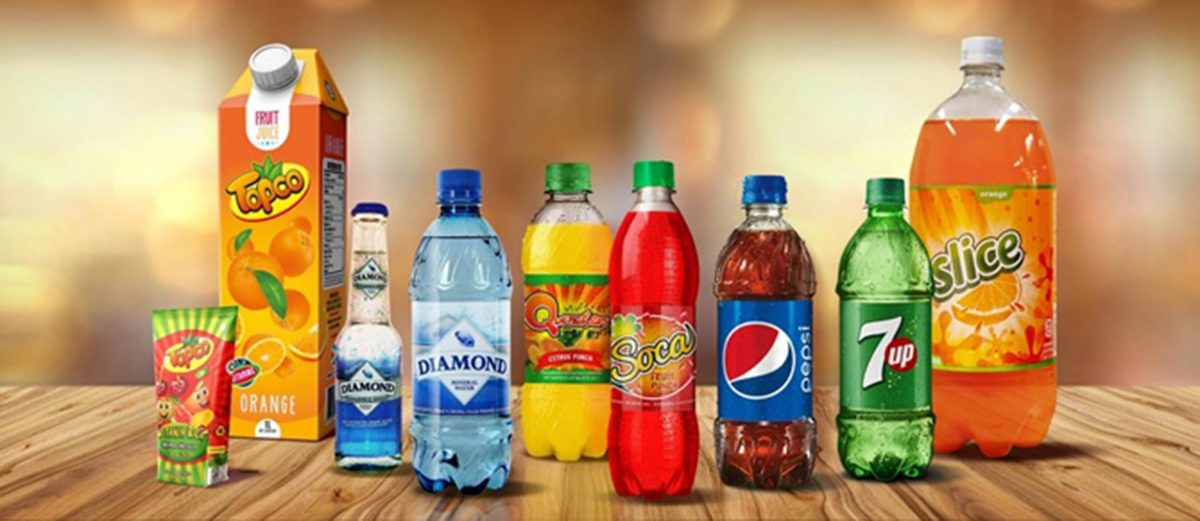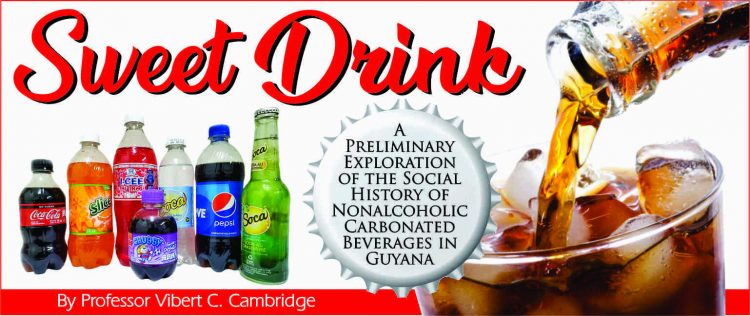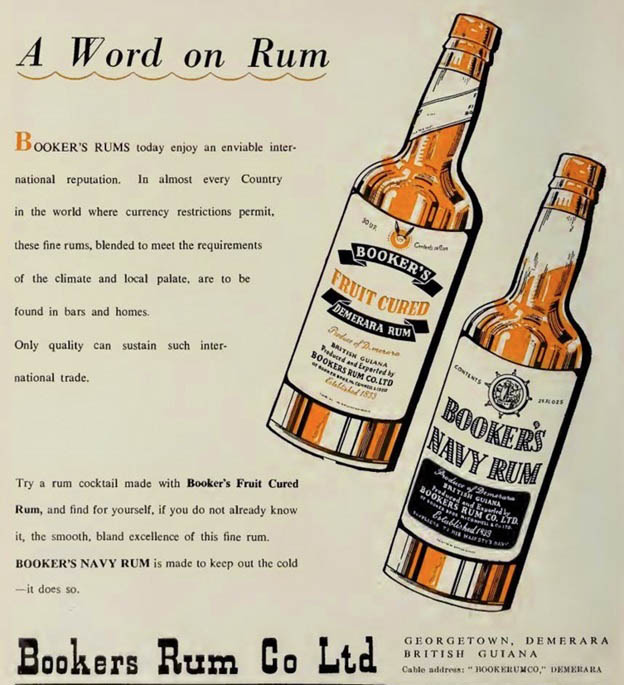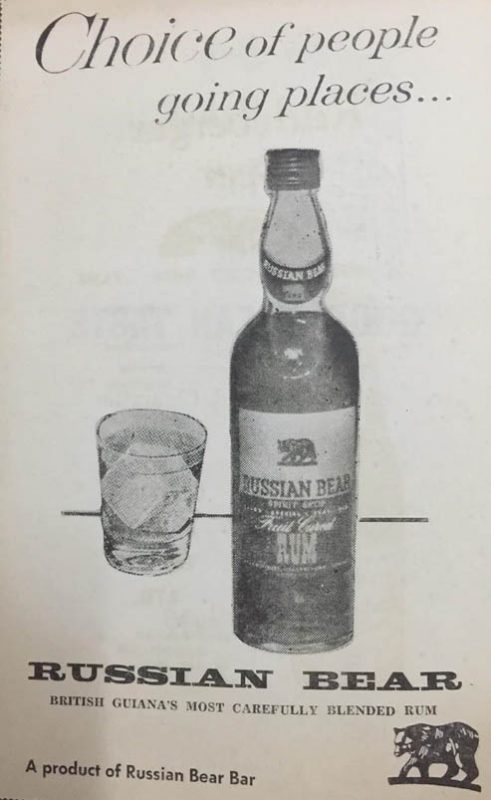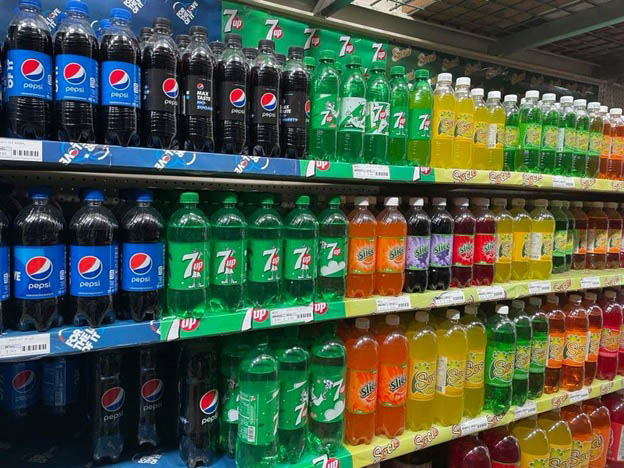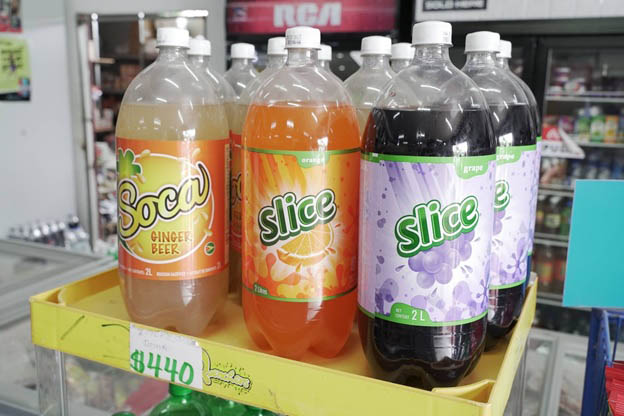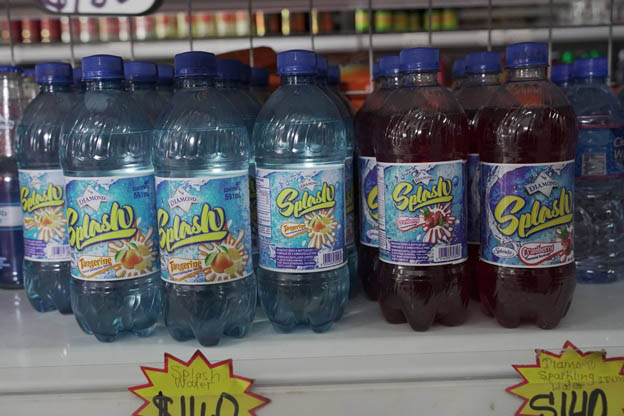The early 1990s saw a new player in the Guyanese sweet drink marketplace: Demerara Distilleries Ltd. (DDL). The new company was established in 1983 from the merger of Guyana Distillers Ltd. (GDL) and Diamond Liquors Ltd. (DLL). These companies emerged from the nationalization of the sugar industry and ancillary rum distilleries in 1976. Guyana Distillers Ltd. was a Bookers Bros. company, and Diamond Liquors was owned by Jessels Holdings.
Although the new company’s core business was rum, there was a sweet drink strand in its DNA. At the dawn of the sweet-drink era in British Guiana, one of the early bottlers was Bookers Bros. Ltd., the original proprietors of the Guyana Distillers companies. Another strand comes from Russian Bear, which was produced by the R. M. Wight company.
In 1975, just before nationalization, Yesu Persaud became the executive chairman of Diamond Liquors. He immediately began to diversify the company’s products to go beyond the exportation of bulk spirits. One step in this direction was the acquisition of R. M. Wight’s Russian Bear Rum company, the producers of King of Diamonds, a 12-year-old rum that was considered Guyana’s best aged rum at that time. As mentioned in an earlier installment, the Russian Bear company also had a multi-flavored sweet-drink line that it bottled at its Georgetown plant.
DDL is the bottler of an internationally recognized rum brand: El Dorado Demerara. In his posts about the Demerara Distilleries Ltd. on the Cocktail Wonk blog, Matt Pietrek offered the following “quirky side note”:
“At the time DDL began selling El Dorado rum in local and certain export markets in the [1980s] Puerto Rico’s Destileria Serrallés was selling “Don Q Eldorado Rum” in the United States. Seeking to move into the U.S. market, DDL subsequently purchased the Eldorado trademark from Serrallés in the early 1990s to avoid any consumer confusion or trademark issues.”
By the late 1980s, DDL had diversified its alcohol line to include whisky, gin, brandy, and vodka. In 1991, the company also entered Guyana’s reawakening sweet-drink market with the Soca brand of aerated, nonalcoholic beverages.
Because of the acute shortage of foreign currencies between 1976 and 1992, the major international brands such as Coca-Cola and Pepsi were absent from the Guyanese sweet drink market. The situation began to change with the introduction of the Economic Recovery Program in 1989.
In 1994, DDL acquired the Guyana franchise for Pepsi and consolidated its place in Guyana’s sweet-drink market. This was part of the company’s strategy to shift from being primarily a bulk exporter of rum. According to its website:
“The company utilized its expertise in the bottling sector, along with its well-established distribution network. DDL took advantage of the carbon dioxide gas it produced as a by-product of the distillation process and started to compete in the carbonated beverages industry.”
In 2021, DDL considered itself “the leading producer of nonalcoholic beverages in Guyana.”
At the end of the second decade of the 21st century, the company was bottling global PepsiCo brands, such as 7up, Mountain Dew, and Slice, in addition to its own homegrown, multi-flavored Soca and Quenchers. DDL’s nonalcoholic line also includes bottled water under the Diamond Mineral Water label, fruit juices under the Tropical Orchard Products (TOPCO) label, and the PepsiCo brands Gatorade and Tropicana. As is the case with Banks DIH, DDL is engaged in other types of businesses:
“DDL also provides shipping and warehousing services and is the Guyanese distributor for brands like Nestlé and Johnson & Johnson. Technically, these services are managed through subsidiaries Demerara Shipping and Distribution Services Limited. However, they are both wholly owned subsidiaries of DDL.”
Innovation
In 2003, DDL made what has been described as the largest investment in Guyana’s food and beverage sector in a decade. It was the US$2.5 million “state-of-the-art Tetra Pak packaging plant.” A 2005 report for the International Labour Organization observed that “the significance of this development lies in the fact that it … confirmed a marked shift towards the food and beverage sector as the leading productive sector within the economy.” This type of innovation has become a hallmark of DDL. Komal Samaroo, chairman since 2014, has highlighted the company’s commitment to innovation and quality:
“We have always been an innovative company over the years. As a relatively small player in a market that is dominated by large multinationals, we have to be ahead of the game. We make economical use of the waste streams from our production process. Hence, since the 1980s, we have been using the CO2 gas that comes from the fermentation process. After purifying it, [we] use it in the production of Pepsi, 7up, and other carbonated beverages. More recently, we started to use the waste that comes out from the distillery to produce methane gas that replaces a lot of the fossil fuel that we use in our boilers to generate steam. In effect, what we do is try to gain a competitive edge by using production waste to create economic value: to reduce overall production cost. In addition, we continue to innovate in new product development.
In 2021, DDL implemented its plan to expand into milk and other noncarbonated beverages. In a 2006 interview, Yesu Persaud said:
“Today, DDL is undoubtedly the only company that is flying the Guyana flag internationally and is doing so with distinction, honor, and credit to Guyana’s image. DDL today is recognized globally as a producer of the finest quality products, and its flagship brand, El Dorado, is internationally known. Our El Dorado brands have proved their superiority time and time again by winning awards and gold medals in London, Chicago, and the Caribbean. The company also has subsidiaries in Holland, the U.S., St. Kitts, and Trinidad and Tobago, and distribution arrangements in Asia. The company employs over 1,400 people and has over 9,000 shareholders.”
Yesu Persaud’s leadership of DDL lasted for more than four decades: “He led the Guyanese rum industry through many twists and turns, including the merger of DLL and GDL, the divestment of the company and, thus, its return to private ownership, and the consolidation of Guyana’s rum distilling at the Diamond Distillery with its eight world-famous Coffey stills.
For his service and philanthropy, Yesu has received several honors, including two national awards (the Golden Arrow of Achievement [A.A.] and the Cacique Crown of Honor [C.C.H.], and honorary degrees. In addition, academic institutes at local and international universities have been named in his honor. They include the Yesu Persaud Center for Caribbean Studies at the University of Warwick in the United Kingdom and the Dr. Yesu Persaud Clinical Education Centre in Georgetown, Guyana. Yesu Persaud is one of the transformative leaders associated with Guyana’s sweet-drink story.
Synthesis
Two economic paradigms have sought dominance in the post-World War II Caribbean. One was a capitalist model with notions of industrialization via strategies such as import substitution. The other was socialism. With the Declaration of Sophia in 1974, Guyana took the socialist path with nationalization as the strategy. This ideological and economic shift had several consequences. One was accelerated emigration.
After World War II, the pace of emigration increased. The United Kingdom was the primary destination. Thus, Guyanese were part of the Windrush generation. The pace further increased in the early 1960s as racial strife tore the society apart and independence approached. The establishment of entry restrictions in the UK caused Guyanese emigrants to seek other destinations. Since the late 1960s, Canada and the United States have been among the preferred destinations. Because of family reunification (“chain migration”) clauses in the UK, Canadian, and U.S. immigration laws, the Guyanese diaspora has grown substantially in these countries. In 2015, it was estimated that more Guyanese lived outside than in Guyana. The “Guyaspora” has a special place in the sweet-drink story.
In the next installment, we shall continue to discuss the sweet-drink bottlers that emerged after the implementation of the 1989 Economic Recovery Program. Specifically, we shall consider two new players from the Caribbean Community.
Select Sources
DDL’s website: https://www.demeraradistillers.com/
Matt Pietrek, “Demerara Distillers Ltd.—Part One.” Available online at: https://cocktailwonk.com/2020/02/demerara-distillers-part-one.html
Matt Pietrek, “Demerara Distillers—Part Two.” Available online at: https://cocktailwonk.com/2020/02/demerara-distillers-part-two.html
World Investment News. Komar Samaroo, (CEO, Demerara Distillers Ltd.,) Available online at: http://www.winne.com/gy/interviews/komar-samaroo
“Guyana’s economic decline during 1985–1991” Available online at: http://www.guyana.org/features/postindependence/chapter18.html
“DDL plugs $4B in plant to produce pasteurized milk, line of fruit juices,” Kaieteur News, December 14, 2019. Available online at: https://www.kaieteurnewsonline.com/2019/12/14/ddl-plugs-4b-in-plant-to-produce-pasteurized-milk-line-of-fruit-juices/?fbclid=IwAR0G0qX7KvTrlJaFQivJKfzUFLsxOooUOd71Fzv5vOpRnpExclJoWb_dHIs
Summit Communications. Yesu Persaud, president and chairman of board of directors, DDL: Interview. The York Times “Special Advertising” section, 2006. Available online at: http://www.summitreports.com/nytd/reports/guyana/interview04.html
https://www.uog.edu.gy/newsletters/dr-yesu-persaud-giant-business-and-philanthropy. Also corroborated by Bernard Heydorn.
“DDL Records After-Tax Profit of [G] $3.48b for 2019 – Up 6.3%.” Stabroek News, March 30, 2020. Available online at: https://www.stabroeknews.com/2020/03/30/news/guyana/ddl-records-after-tax-profit-of-3-48b-for-2019/
© Vibert C. Cambridge, 2021

